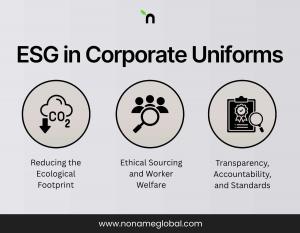The Rise of Conscious Corporate Uniforms With ESG
Companies are rapidly adopting conscious corporate uniforms, and sustainable uniforms have become a key tool for transparency and brand responsibility.
From UAE hospitality groups adopting bamboo and organic cotton fabrics to Indian logistics firms replacing polyester uniforms with eco friendly alternatives, the demand for sustainable workwear has grown rapidly. With mandatory disclosures, consumer scrutiny, and employee expectations shaping brand identity, uniforms now serve as a visible and meaningful part of a company’s ESG strategy. In this new era, uniforms are more than functional garments. They represent values, credibility, and corporate responsibility.
The Rise of Conscious Corporate Uniforms in an ESG Driven World
The adoption of conscious corporate uniforms marks one of the most significant changes in workplace apparel. Organisations are moving away from traditional, polyester heavy garments and integrating sustainability principles into workwear procurement. This shift is being driven by regulatory reforms, growing consumer awareness, and the need for transparent, ethical supply chains.
Key Drivers Behind the Shift
1. Regulatory Requirements Reshaping Procurement
Policies such as the EU Corporate Sustainability Reporting Directive (CSRD) and the Ecodesign for Sustainable Products Regulation (ESPR) have made sustainability reporting compulsory. These regulations require detailed disclosure of textile sourcing, emissions, recycling commitments, and labor conditions. Corporate uniforms fall directly within these reporting frameworks, making sustainable workwear essential for compliance.
2. Changing Consumer and Employee Expectations
Younger generations prioritise brands that reflect ethical and sustainable values. Recent studies show that nearly 68 percent of job seekers prefer employers with strong ESG commitments, and consumers are willing to pay higher prices for environmentally responsible products.
Sustainable uniforms offer companies a daily opportunity to demonstrate these values through visible, employee centered actions.
3. Risk Reduction and Brand Reputation
Choosing eco friendly, ethically sourced uniforms helps reduce reputational risks, supply chain issues, and exposure to negative media linked to poor labor conditions or environmentally harmful practices. Sustainable uniforms are a fast and effective way for companies to communicate accountability across their operations.
ESG and Conscious Corporate Uniforms in Everyday Workwear
A. Environmental Pillar: Reducing Ecological Footprint
The environmental aspect of ESG emphasises reducing waste, conserving resources, and choosing materials that minimise harm to the planet. Key sustainable practices include:
Fabrics made from organic cotton, recycled polyester (rPET), Tencel, bamboo, coffee grounds, banana fibres, or other bio based resources
Water saving production, including advanced recycling systems and low impact dyeing
Natural and low toxicity dyes
Biodegradable materials and compostable blends
Take back programs for end-of-life uniforms
Digital patterning to cut fabric waste
Circular procurement partnerships
Indian textile leaders are instrumental in this transformation. Arvind Mills operates Zero Liquid Discharge facilities and supplies organic and recycled textiles. Birla Cellulose manufactures Lyocell and other sustainable fibres through responsible forestry and closed loop processes. KG Cotton produces BCI and organic cotton using controlled, low-impact farming, while Raymond Mills supports energy efficient manufacturing and recycled polyester solutions such as R|Elan.
These mills ensure that sustainable uniforms support climate-positive objectives while meeting international standards.
B. Social Pillar: Ethical Sourcing and Worker Welfare
The social dimension focuses on protecting workers, ensuring fair wages, and maintaining transparent supply chains. Priorities include:
Ethical labor practices and fair wage systems
Safe, healthy, and inclusive working environments
Strict compliance documentation and global certifications
Child-labor free and gender inclusive policies
Chemical safety measures to protect workers
Indian mills strengthen this pillar through strong welfare initiatives. Arvind Mills supports worker training, healthcare, and chemical safety programs. Birla Cellulose maintains responsible forestry, global audits, and labour compliance. Raymond Mills promotes workplace diversity and international labor standards, while KG Cotton aligns with SEDEX and BSCI requirements to ensure ethical manufacturing.
C. Governance Pillar: Transparency and Verified Standards
Governance ensures accuracy, clarity, and legitimacy across sustainability claims. Important mechanisms include:
APEC Standards
Sedex (SMETA) Compliance
ISO 9001, ISO 14001, ISO 45001
OEKO TEX and GOTS certifications
Digital tracking systems for supply chain visibility
Third party audits and transparent vendor reporting
This framework ensures that sustainable uniforms are credible, traceable, and fully compliant.
Conscious Corporate Uniforms in the UAE, GCC, and India
The adoption of conscious corporate uniforms is accelerating in the UAE, GCC countries, and India. Examples include:
NoName (Worldwide) supplying sustainable, commercially durable uniforms made from organic cotton, rPET, bamboo blends, and low impact fabrics.
Lindström India producing uniforms made from recycled polyester derived from PET bottles.
Green World Merchandise (UAE) offering sustainable uniforms and hijabs using recycled fibres and organic cotton.
Ganesha Ecosphere and Indian Oil’s “Unbottled” initiative converting PET waste into eco friendly uniforms.
These developments highlight a region wide commitment to responsible textile use and ESG aligned uniform programs.
NoName’s Leadership in Conscious Corporate Uniforms
NoName, one of the leading corporate uniform manufacturers in India, produces sustainable uniforms using GOTS certified organic cotton, bamboo blends, recycled polyester, and low impact fabrics sourced from responsible mills. All uniforms are manufactured under Sedex, ISO, and APEC aligned facilities, ensuring ethical labor, safe conditions, and transparent supply chain reporting.
With flexible MOQs, rapid delivery, and fully traceable production systems, NoName supports corporations across the UAE, GCC, India, Europe, and the United States.
For companies ready to move from polyester to sustainable workwear solutions, NoName is prepared to support every step of the transition with fully compliant, comfortable, and ESG aligned corporate uniform programs.
Pankaj Agrawal
Celestial Corporation
+91 96505 08508
pankaj@celestialfix.com
Visit us on social media:
LinkedIn
Instagram
Facebook
YouTube
The Rise of Conscious Corporate Uniforms (What Fashion Brands Must Know in 2025)
Legal Disclaimer:
EIN Presswire provides this news content "as is" without warranty of any kind. We do not accept any responsibility or liability for the accuracy, content, images, videos, licenses, completeness, legality, or reliability of the information contained in this article. If you have any complaints or copyright issues related to this article, kindly contact the author above.



